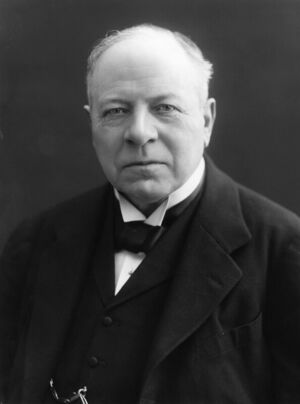Difference between revisions of "Richard Haldane"
Jump to navigation
Jump to search
(Created page with "{{person |wikipedia=https://en.wikipedia.org/wiki/Richard_Haldane,_1st_Viscount_Haldane |spartacus=http://spartacus-educational.com/TUhaldane.htm |twitter= |image= |birth_date...") |
(add image, short bio) |
||
| (3 intermediate revisions by 3 users not shown) | |||
| Line 2: | Line 2: | ||
|wikipedia=https://en.wikipedia.org/wiki/Richard_Haldane,_1st_Viscount_Haldane | |wikipedia=https://en.wikipedia.org/wiki/Richard_Haldane,_1st_Viscount_Haldane | ||
|spartacus=http://spartacus-educational.com/TUhaldane.htm | |spartacus=http://spartacus-educational.com/TUhaldane.htm | ||
| − | + | |image=Viscount Haldane.jpg | |
| − | |image= | + | |birth_date=1856-07-30 |
| − | |birth_date= | + | |death_date=1928-08-19 |
| − | |death_date= | ||
|constitutes=politician | |constitutes=politician | ||
| + | |description=Uk Secretary of State for War between 1905 and 1912 during which time reforms of the British Army were implemented, with the secret task of a European war. | ||
| + | |alma_mater=Edinburgh Academy,Göttingen University, University of Edinburgh | ||
| + | |birth_place=Edinburgh, Scotland | ||
| + | |death_place=Auchterarder, Perthshire | ||
| + | |employment={{job | ||
| + | |title=Secretary of State for War | ||
| + | |start=10 December 1905 | ||
| + | |end=12 June 1912 | ||
| + | }}{{job | ||
| + | |title=Lord Chancellor | ||
| + | |start=10 June 1912 | ||
| + | |end=25 May 1915 | ||
| + | }}{{job | ||
| + | |title=Lord Chancellor | ||
| + | |start=22 January 1924 | ||
| + | |end=6 November 1924 | ||
| + | }}{{job | ||
| + | |title=Leader of the House of Lords | ||
| + | |start=22 January 1924 | ||
| + | |end=3 November 1924 | ||
}} | }} | ||
| + | }} | ||
| + | '''Richard Burdon Haldane, 1st Viscount Haldane''' was an influential British [[Liberal Party (UK)|Liberal]] and later [[Labour Party (UK)|Labour]] politician, lawyer and philosopher. He was [[Secretary of State for War]] between 1905 and 1912 during which time the "[[Haldane Reforms]]" of the British Army were implemented. Raised to the peerage as [[Viscount Haldane]] in 1911, he was [[Lord Chancellor]] between 1912 and 1915, when he was forced to resign because of false allegations of German sympathies. He later joined the Labour Party and once again served as Lord Chancellor in 1924 in the first Labour administration. Apart from his legal and political careers, Haldane was also an influential writer on philosophy, in recognition of which he was elected a Fellow of the [[British Academy]] in 1914. | ||
{{SMWDocs}} | {{SMWDocs}} | ||
==References== | ==References== | ||
{{reflist}} | {{reflist}} | ||
| − | |||
Latest revision as of 02:09, 25 June 2021
(politician) | ||||||||||||||
|---|---|---|---|---|---|---|---|---|---|---|---|---|---|---|
 | ||||||||||||||
| Born | 1856-07-30 Edinburgh, Scotland | |||||||||||||
| Died | 1928-08-19 (Age 72) Auchterarder, Perthshire | |||||||||||||
| Alma mater | Edinburgh Academy, Göttingen University, University of Edinburgh | |||||||||||||
| Member of | Coefficients (dining club) | |||||||||||||
Uk Secretary of State for War between 1905 and 1912 during which time reforms of the British Army were implemented, with the secret task of a European war.
| ||||||||||||||
Richard Burdon Haldane, 1st Viscount Haldane was an influential British Liberal and later Labour politician, lawyer and philosopher. He was Secretary of State for War between 1905 and 1912 during which time the "Haldane Reforms" of the British Army were implemented. Raised to the peerage as Viscount Haldane in 1911, he was Lord Chancellor between 1912 and 1915, when he was forced to resign because of false allegations of German sympathies. He later joined the Labour Party and once again served as Lord Chancellor in 1924 in the first Labour administration. Apart from his legal and political careers, Haldane was also an influential writer on philosophy, in recognition of which he was elected a Fellow of the British Academy in 1914.
Many thanks to our Patrons who cover ~2/3 of our hosting bill. Please join them if you can.